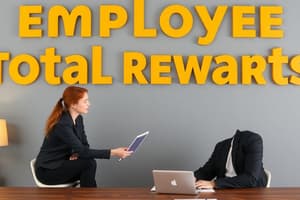Podcast
Questions and Answers
What is the primary goal of employee benefits consulting?
What is the primary goal of employee benefits consulting?
- To attract, retain, and engage employees while controlling costs and ensuring compliance with regulations (correct)
- To educate employees about benefits only
- To focus solely on health and wellness benefits
- To increase employee benefits costs
Which of the following is NOT a type of employee benefit?
Which of the following is NOT a type of employee benefit?
- Flexible work arrangements
- Stock options
- Professional development training (correct)
- Paid time off
What is a key skill required for an employee benefits consultant?
What is a key skill required for an employee benefits consultant?
- Analytical and problem-solving skills (correct)
- Project management experience
- Financial planning skills
- Marketing expertise
What is a benefit of employee benefits consulting for organizations?
What is a benefit of employee benefits consulting for organizations?
What is a key role of an employee benefits consultant?
What is a key role of an employee benefits consultant?
What is a type of employee benefit that supports work-life balance?
What is a type of employee benefit that supports work-life balance?
What is a certification that an employee benefits consultant may hold?
What is a certification that an employee benefits consultant may hold?
Why is compliance with regulations an important aspect of employee benefits consulting?
Why is compliance with regulations an important aspect of employee benefits consulting?
Flashcards are hidden until you start studying
Study Notes
What is Employee Benefits Consulting?
- A type of consulting service that helps organizations design, implement, and manage employee benefits programs
- Aims to attract, retain, and engage employees while controlling costs and ensuring compliance with regulations
Types of Employee Benefits
- Health and Wellness: medical, dental, vision, life insurance, disability, and wellness programs
- Retirement: 401(k), pension, and other retirement plans
- Paid Time Off: vacation, sick leave, holidays, and other forms of paid time off
- Financial Benefits: bonuses, stock options, and other financial incentives
- Work-Life Benefits: flexible work arrangements, dependent care, and other benefits that support work-life balance
Role of an Employee Benefits Consultant
- Assess and Analyze: evaluate current benefits programs, identify areas for improvement, and recommend changes
- Design and Implement: develop customized benefits programs, communicate with employees, and ensure compliance with regulations
- Manage and Administer: oversee benefits administration, resolve issues, and provide ongoing support
- Communicate and Educate: educate employees about benefits, ensure understanding and appreciation of benefits
Benefits of Employee Benefits Consulting
- Improved Employee Engagement: attractive benefits programs can increase job satisfaction and retention
- Cost Savings: consultants can help organizations optimize benefits spending and reduce costs
- Compliance and Risk Management: consultants ensure compliance with regulations, reducing the risk of fines and penalties
- Increased Efficiency: consultants can streamline benefits administration, freeing up HR resources for other tasks
Key Skills and Qualifications for an Employee Benefits Consultant
- Benefits Knowledge: in-depth understanding of employee benefits programs, regulations, and industry trends
- Communication and Interpersonal Skills: ability to communicate effectively with employees, HR, and management
- Analytical and Problem-Solving Skills: ability to analyze data, identify issues, and develop solutions
- Certifications and Training: professional certifications, such as CEBS (Certified Employee Benefits Specialist) or SHRM-CP (Society for Human Resource Management Certified Professional)
Employee Benefits Consulting
- Employee benefits consulting is a type of consulting service that helps organizations design, implement, and manage employee benefits programs to attract, retain, and engage employees while controlling costs and ensuring compliance with regulations.
Types of Employee Benefits
- Health and Wellness benefits include medical, dental, vision, life insurance, disability, and wellness programs.
- Retirement benefits include 401(k), pension, and other retirement plans.
- Paid Time Off benefits include vacation, sick leave, holidays, and other forms of paid time off.
- Financial Benefits include bonuses, stock options, and other financial incentives.
- Work-Life Benefits include flexible work arrangements, dependent care, and other benefits that support work-life balance.
Role of an Employee Benefits Consultant
- Employee benefits consultants assess and analyze current benefits programs to identify areas for improvement and recommend changes.
- They design and implement customized benefits programs, communicate with employees, and ensure compliance with regulations.
- They manage and administer benefits, oversee benefits administration, resolve issues, and provide ongoing support.
- They communicate and educate employees about benefits, ensuring understanding and appreciation of benefits.
Benefits of Employee Benefits Consulting
- Employee benefits consulting leads to improved employee engagement, increasing job satisfaction and retention.
- It helps organizations achieve cost savings by optimizing benefits spending and reducing costs.
- It ensures compliance with regulations, reducing the risk of fines and penalties.
- It increases efficiency by streamlining benefits administration, freeing up HR resources for other tasks.
Key Skills and Qualifications for an Employee Benefits Consultant
- Employee benefits consultants require in-depth knowledge of employee benefits programs, regulations, and industry trends.
- They need strong communication and interpersonal skills to communicate effectively with employees, HR, and management.
- They must possess analytical and problem-solving skills to analyze data, identify issues, and develop solutions.
- They should have professional certifications, such as CEBS (Certified Employee Benefits Specialist) or SHRM-CP (Society for Human Resource Management Certified Professional).
Studying That Suits You
Use AI to generate personalized quizzes and flashcards to suit your learning preferences.




